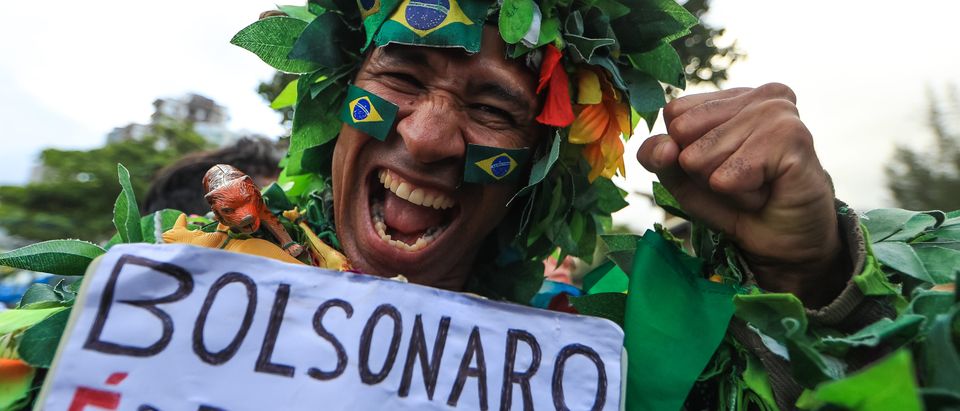Having survived an assassination attempt just weeks prior to Brazil’s 2018 presidential election, Jair Bolsonaro handily defeated Fernando Haddad. While the world watched as yet another country elected to its highest office an outspoken, populist conservative — so did Brazil’s potential trade partners and investors.
With a nearly $2.1 trillion economy, Brazil’s nominal GDP ranks eighth globally and second in the Americas, behind the United States and just ahead of Canada. International investors can appreciate the economic force that is Brazil — an important U.S. geopolitical ally with vast, untapped potential.
Fernando Haddad was the handpicked replacement of former President Luiz Inacio “Lula” da Silva, who was barred from running due to serving jail time for corruption.
The election has felt especially historic as the candidates presented a choice between Haddad, representing a continuance of ineffective leftist policies, and Bolsonaro, who represented a shift to the right and a voice promising to lead Brazil beyond socialism and corruption.
The economy, long derailed by far-left economic policy, was a central focus during the campaign. On an annual basis, the Heritage Foundation releases its well-respected Index of Economic Freedom report, and, despite the sheer mass and depth of its economy, Brazil regularly receives poor grades.
In addition to socialist policies hurting the economic freedom of Brazilian citizens, corruption has been cited as one of the leading reasons for a sputtering economy. According to The Heritage Foundation:
Former President Luiz Inácio ‘Lula’ da Silva of the Socialist Workers’ Party faces multiple judicial trials on charges of corruption. His successor, Dilma Rousseff, had continued his leftist and populist agenda but was impeached and removed from office early in her second term for alleged budgetary misconduct to boost vote-buying during an ongoing economic downturn precipitated by crashing commodity prices. Michel Temer, a market-oriented centrist who then assumed the presidency, has also been tainted by allegations of corruption.
In response to this history of stagnation, Bolsonaro swept into the political spotlight, lifted by a weary electorate seeking an end to public corruption, economic turmoil, and the endemic crime that has plagued Brazilian cities. With support from some of the nation’s most prominent sports figures, corporate leaders, military leaders, as well as other prominent citizens, Bolsonaro seemed to attract constant attention.
The election took a dramatic turn, however, following an assassination attempt that left Bolsonaro in a hospital bed recovering from a stab wound and extreme (40 percent) blood loss. Yet from that bed, he was able to look on in solace, watching as the results showed him receiving 46 percent of the vote in an October 7 election over 13 other candidates in the first round.
Now, following his win in the second round over Fernando Haddad, it’s clear that for the Brazilian citizens the election of Jair Bolsonaro represents the promise of economic growth and improved trade relations with the United States.
In an interview with Bloomberg News on October 17, 2017, Bolsonaro pledged to “consider the privatization of state companies in all sectors” and “nullify issues of corruption in state-owned companies.” He also promised to shift trade ties away from China and to increase economic ties to the United States
The promise of an economic recovery, in the mold of President Donald J. Trump’s push to lower the tax and regulatory burden in the US, is something Bolsonaro can point to as an example of how he will govern. For better or worse, he is often referred to as “The Trump of Brazil.”
In addition to economic woes, one of the biggest issues in Brazil has been an epidemic of crime. The Heritage Foundation points to “the record 63,000+ murders recorded last year” in Brazil. In Rio, martial law has been declared to stop gangs from taking over governance of the city.
One solution, according to Bolsonaro, is for the people of Brazil to be granted the right to protect themselves, promising to reduce gun restrictions and expand the ability of lawful citizens to purchase and own firearms.
With his promise to fight corruption, crime, and big government, Bolsonaro captured the imagination of the Brazilian people who yearn for expanded freedoms and accountability from its leaders.
Bolsonaro’s victory is a bellwether for South and Central American politics. The result should lift and embolden politicians attempting to move away from the region’s history of failed socialist policies. Policies that have led to so much stagnation and have fueled the current migration of Central Americans to free market economies in the north.
For the international community, the main takeaway from Bolsonaro’s victory is that Brazil is open for business. Surely on the way are more favorable trade policies and a pro-business mentality, Brazil is positioned to become a leading target for Western investors.
Bolsonaro may usher in a new era of Central and South American politics that distance the region away from failed socialist policies and toward improved trade relations with the United States and more economic freedom. It has often been said that Brazil is the future of South America. Perhaps now it is true.
Mark Cowan is CEO of Potomac International Partners served in the administrations of Presidents Ronald Reagan, George H.W. Bush, George W. Bush, the Trump Transition Team and with the U.S. intelligence community. Cowan has aided companies that do business in Brazil for many years and has worked with Bolsonaro regarding U.S.-Brazil relations.
The views and opinions expressed in this commentary are those of the author and do not reflect the official position of The Daily Caller.


